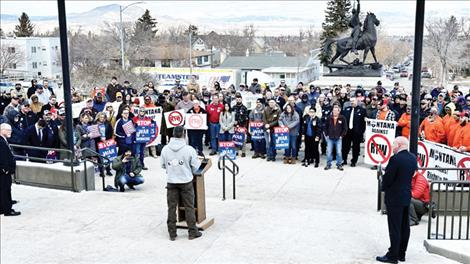Right-to-work resurfaces at the Montana Legislature, as do dozens of pro-union opponents
The proposal would prevent private sector unions from requiring membership or dues as a condition of employment.
Hey savvy news reader! Thanks for choosing local.
You are now reading
1 of 3 free articles.
HELENA — The Capitol was awash in shades of hi-vis yellow and orange Friday as dozens of union workers testified in opposition to proposed legislation that would establish Montana as the country’s 28th right-to-work state.
The bill, Buffalo Republican Rep. James Bergstrom’s House Bill 448, would prohibit private sector union contracts that require employees to join a union or otherwise pay fees for their representation. It’s the latest legislative swing at unions in Montana, a state with a deep history of labor activism that has repeatedly resisted right-to-work legislation even as national union density has declined and neighboring states have passed similar laws.
“Blood has been spilled on the streets of my district for the rights we have today,” Rep. Derek Harvey, D-Butte, a union firefighter, told more than 70 union workers and officials representing a wide variety of trades on the Capitol steps Friday.
The crowd evoked scenes from last session when union members packed the House gallery during floor debate on an ultimately unsuccessful right-to-work bill.
“I’d like to say a simple walk through these halls today should be enough to persuade all of you to vote no on this bill,” Greg Ferguson, a member of Ironworkers Local 732, told the House Business and Labor Committee Wednesday morning. “And if it does pass, we’ll all know you put power and profits above people.”
HB 448 is essentially identical to the 2021 bill, HB 251. That bill failed in dramatic fashion on the House floor, 38-62. Both bills derive their language largely from model legislation circulated by well-funded conservative advocacy groups like the American Legislative Exchange Council, more commonly known as ALEC.
Bergstrom’s bill attracted only four proponents Friday, all but one of whom — Rep. Caleb Hinkle, R-Belgrade, who carried House Bill 251 in the 2021 session — were in some way affiliated with the national effort by conservative business interests to end what they call “forced unionism,” in other words, the compulsion of union membership or dues-paying. Those interests include Americans for Prosperity, the National Right to Work Committee and Montana Citizens for Right to Work.
“This bill would protect every individual from being compelled to pay union dues or fees in order to work for a living, finally making Montana the 28th right-to-work state,” Randy Pope, the executive director of Montana Citizens for Right to Work, told the committee Friday. “Unfortunately, under current law in Montana, a union boss can choose to impose monopoly bargaining on workers, taking away an individual’s right to negotiate for themselves. They demand government-enforced authority to extract dues or fees from the unconsenting worker, adding insult to injury.”
Pope and other proponents say the bill is about worker freedom and accountability for union “bosses.” If unions can’t rely on a steady stream of dues, they’ll be compelled to provide better service to entice membership, he said.
“Good unions don’t need forced dues, and bad unions don’t deserve them,” Pope said.
Right-to-work is already the presumptive law of the land for public sector unions under a 2018 U.S. Supreme Court decision. Right-to-work legislation in Montana would impact the private sector.
The arguments in favor of the bill misunderstand — or misstate — the legal reality, opponents testified Friday.
“While the bill title presumes to give workers the freedoms to not join a union, workers already have that right,” testified Amanda Frickle, a lobbyist for the Montana AFL-CIO. “No one is forced to join a union. Not in Montana, and nowhere else in the country. This bill does not give workers any right they do not already have.”
So-called closed shops — in which union membership is an exclusive condition of employment – are illegal under the Taft Hartley Act, a 1947 amendment to the National Labor Relations Act that has also allowed for the proliferation of right-to-work laws over the last half-century.
But under union security contracts, employers can hire non-union labor under the requirement they join the union within a certain time. Even in those cases, “employees who object to full union membership may continue as ‘core’ members and pay only that share of dues used directly for representation, such as collective bargaining and contract administration,” according to the National Labor Relations Board.
That’s essentially what this bill targets — the requirement that those who object to union membership pay some kind of representation fee.
Unions oppose that change because of what’s often called the free-rider problem. Under the law, unions with exclusive bargaining rights in a workplace must represent all of its workers, whether or not they’re active members of the union. Collecting representation fees addresses that contradiction, they say.
Losing that ability is detrimental to a union and its ability to effectively bargain for workers, testified Mario Martinez, the lead representative for Montana Carpenters Local 82.
“What 448 does is it starts to erode and defund unions,” he said. “If you have half the people coming into your union, and they don’t have to pay the freight for the benefit the others are paying for, then it starts to erode.”
Opponents also pointed to language in the bill that bans workers from striking during collective bargaining in order to convince an employer to enter into a union security agreement as in conflict with the NLRA, which protects the right to “concerted activity.” And they said the bill would illegally infringe on the contract negotiations between two private parties.
But more broadly, the message from most opponents was that they simply liked their union, the benefits, training, wages and safety measures it provides, and were happy to pay dues.
“I have been a statistic on both sides of this fence, union and non-union,” testified Jason Hottel from Ironworkers Local 732. “I’m originally from Idaho, and I’ve had to fight for the right — I’ve not had insurance, had low paying wages, and the only time you could ever get a good wage was to have them compare you and your skill to a union worker. [Unions] saved my life, saved my family’s life, and I’ve been able to provide a wage for my children that they deserve, and it has everything to do with opposing this bill.”
Several large employers in Montana came in opposition as well, including Northwestern Energy, which has 632 union workers, testified Northwestern lobbyist David Hoffman.
The bill, he said, would “send a negative and demoralizing message to those workers” and disrupt workplace relations.
Democratic lawmakers in Montana are often the most forceful about their defense of unions. But opposition to the right-to-work bill has bipartisan traction.
“I’ve been a union member 26 years of my life,” testified Sen. Jason Small, R-Busby, a boilermaker who chairs the Senate Business and Labor Committee. “Not one time have I ever been forced to join one, but it’s always been a heck of an opportunity. I’ll be up here, this’ll be my fourth session. Unfortunately these sessions occur during our peak earning time of the year for fixing power plants and everything else. Probably about $350,000 in lost wages into just trying to stop stuff like this bill right here.”
The failure of right-to-work legislation in the 2021 session seems to drive that point home. And this session, related laws affecting unions in the public and non-profit sectors have stalled in committee.
“I think last session when a right to work bill made it by far, I think by labor coming up, showing up in force the way they did, I think that’s still stuck in the memories of lots of the representatives that were here,” Harvey, the lawmaker, said. “And, you know, all I can hope is that they share with our new colleagues just what that day was. The feeling in the building that day, it was a powerful force that came in against it. And it was Montana workers letting their voices be heard.”
The committee did not take a vote on the bill Friday.
















